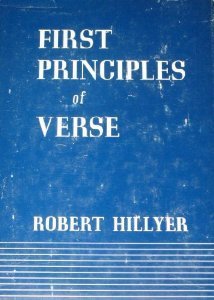
| Title | : | First Principles of Verse |
| Author | : | |
| Rating | : | |
| ISBN | : | - |
| Language | : | English |
| Format Type | : | Hardcover |
| Number of Pages | : | 158 |
| Publication | : | First published January 1, 1938 |
First Principles of Verse Reviews
-

This book may not be as good as my enjoyment level would imply it is; but it is fascinating and very sad, in a way that I want to call charming. Both Hillyer's conception of what constitutes poetry, and the very world that made such poetry possible, had been gone for two decades when he wrote this book, and Hillyer's rear-guard action, although he doesn't know it is one, was doomed from the start.
One anecdote Hillyer tells is illustrative: someone is holding Robert Frost up as an example of a "rootless" poet who is not inspired by the classics. "By good fortune, a professor of Greek who formerly had taught Mr. Frost was present, and summoned us to his study. He produced his old records, opened to Frosts's name, and there across the page, recitation after recitation, test after test, was an unbroken series of A grades."
This anecdote strikes me as unlikely, although I guess stranger things have happened, but more importantly it is absurd. The fact that Frost got good grades in Greek is a non sequitur. That this was not apparent to Hillyer, and that it could not help but be apparent to any poet a couple of decades later, is what gives the book its pathos.
Watching Hillyer take a poem and write next to each line "good," fair," or "bad," satisfied and sure of every esthetic judgment, is marvelous. Such a performance will never come again, and if it looks like kitsch, that's partially our jealously. Also, partially it's kitsch.
There's some pretty good advice about poetic diction, but it comes from a worldview that was narrow for 1938 and has now narrowed so much further that it has closed, like a summer passage between icebergs. There's no way through it any more.
Of course, I agree with him about 80% of the time. -

I found this book at an old job that was moving offices and had placed all their internal books on a table for people to take if they wanted. I thought it might be interesting. A couple of the chapters were, including the beginning chapters explaining some of the basic terminology of poetry, and I gleaned some information from it, but ultimately it proved very antiquated.
This would have been the book that Robin Williams' character ripped the pages from in the scene from Dead Poets Society: partially useful at the time, but ultimately very stuffy and bereft of passion.





